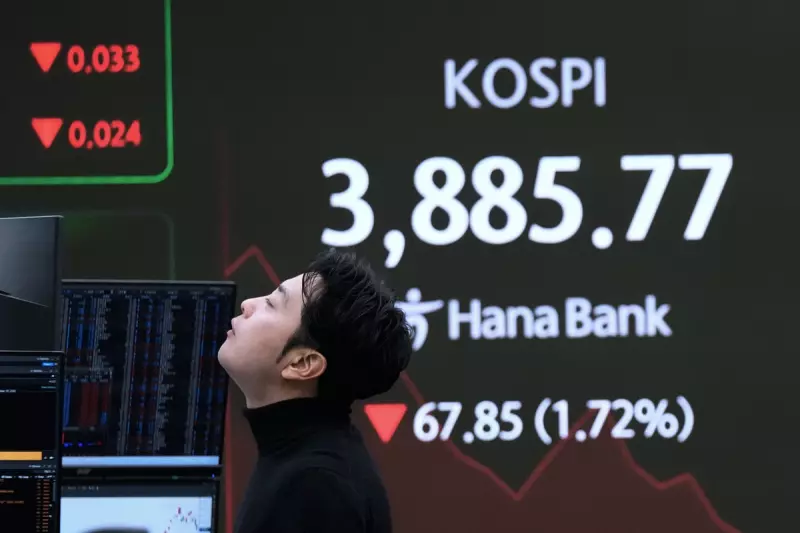
Asian Markets Retreat Amid Global Tech Worries
Shares across Asia-Pacific markets fell on Wednesday as investor caution prevailed ahead of a crucial earnings report from chipmaking giant Nvidia. The company's performance is widely viewed as a barometer for the artificial intelligence sector, which has driven much of the recent market enthusiasm.
Japan's Nikkei 225 remained nearly flat, closing at 48,724.17. However, other major indices saw declines. Hong Kong's Hang Seng dropped 0.5% to 25,812.54, while the Shanghai Composite slipped just over a point to 3,939.29. Australia's S&P/ASX 200 shed 0.1% to 8,458.40, and South Korea's Kospi fell 0.5% to 3,934.58.
Nvidia's Pivotal Role in Global Sentiment
The focal point for global markets is the impending earnings report from Nvidia, due later in the day. The chipmaker's influence is disproportionate; its immense size means it is the single most influential stock on Wall Street. After fervent demand for its AI chips propelled its total value to briefly top $5 trillion, Nvidia now single-handedly steers the direction of the S&P 500 on some days.
This performance is critically important to the savings of millions, as it heavily impacts 401(k) retirement accounts. Nvidia has already led Wall Street lower, with its shares falling 2.8% on Tuesday. This decline has brought the chipmaker's loss for the month so far to more than 10%, a steep drop that qualifies as a market correction.
Broader Market Pressures and the AI Bubble Concern
The unease extends beyond a single company. On Tuesday, the S&P 500 declined 0.8% to 6,617.32, retreating further from its all-time high. The Dow Jones Industrial Average lost 1.1% to 46,091.74, and the Nasdaq composite sank 1.2% to 22,432.85.
This marks a sharp turnaround from a nearly relentless rally since April. Critics have long warned that this surge, particularly in AI-related stocks, may have carried prices too high, too fast, leaving the market vulnerable to a sharp drop. According to a Bank of America Global Research survey, 45% of big investors now identify an AI bubble as the number one risk to the market, surpassing potential trouble in the bond market, inflation, and trade wars.
Further weighing on sentiment is uncertainty around US interest rates. Traders, who had earlier anticipated a Federal Reserve rate cut in December, are now less sure. The Fed has already cut rates twice this year to bolster a slowing job market, but persistent inflation above its 2% target complicates future decisions.
Adding to the pressure is the upcoming release of a key US jobs report on Thursday, the first after a hiatus caused by the recent US government shutdown.
The market's struggles are also visible in other high-flying areas. Bitcoin's price briefly fell below $90,000 on Tuesday, down from nearly $125,000 last month, though it later recovered some ground to trade at $91,700 early Wednesday.
In currency and commodity markets, the US dollar was slightly lower against the yen at 155.46. Benchmark US crude oil lost 19 cents to $60.48 a barrel, while Brent crude fell 20 cents to $64.69 a barrel.





